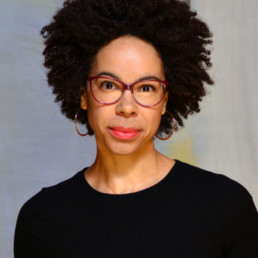The radical act of rest
Nap Ministry founder Tricia Hersey says rest is an essential part of racial justice work
This week feels like go time. “There is so much to get done in this new administration,” Brittany Packnett Cunningham says in this week’s episode of UNDISTRACTED. “Let’s get moving. Everyone is talking about what we need to get done in the first hundred days.”
So it might seem counterintuitive to talk about slowing down. But podcast guest Tricia Hersey, founder of the Nap Ministry, argues that’s exactly what we should be focusing on. Hersey—who is also a poet, performance artist, activist and ordained minister (she’s known as the “Nap Bishop”)—says rest can be a form of radical resistance and healing, and that it’s essential if we want to dream the big dreams that will help construct a better future.
You won’t want to miss Hersey’s smart advice which, she will tell you, has nothing to do with “wellness,” and everything with creating a more just world.
In their conversation, Packnett Cunningham and Hersey break it down further. Some of our favorite parts:
- Hersey on the ways in which rest is radical: “All of culture is in collaboration for us not to rest. Every single part of our culture—from academia, to public schools, to the churches—everything is in collaboration for us to continue to use our bodies as a tool for their production. And so to understand how truly bamboozled you have been, it’s going to take some grieving around that. It’s going to take some understanding that grind culture is violence. And how do you want to align with that? Do you want to align with white supremacy and capitalism—and be exhausting your body? Or do you want to disrupt and dismantle it? And rest can be that way for us to be able to push back against it.”
- Hersey on why it’s so important to find time for rest—even now: “It really is a time to rest. It always has been, but I think rest needs to become centered, become seen as a social justice and racial justice issue. It’s a public health issue. And so to think that we can continue on from an exhausted disconnected state, because really when we aren’t resting, it’s bigger than just doing an all-nighter and not feeling well the next day. We really are disconnecting from our body. The more that we do that, the more we’re able to not have empathy and the more we’re able to not be able to give care, and without care in the world, none of us would be free.”
- Hersey on how to build space for rest: “My grandmother Ora, who was the muse for this work, she was a Jim Crow survivor…She worked two jobs, sometimes three jobs, raising nine children…She sat every single day on her couch with her eyes closed and she rested her eyes. And [when we asked about it], she was like, ‘I’m not asleep. You know, every shut-eye ain’t sleep. I’m resting my eyes so I can get a word—so I can hear what the universe wants to tell me.’…I think creating a space and re-imagining rest for yourself is really the work…I will tell people it may look like closing your eyes for five minutes in your car while you’re in a parking lot. It may be before you get out of the shower in the morning…taking two minutes for yourself.”
Listen on Apple Podcasts, Spotify, Stitcher or wherever you get your podcasts.
WHAT OUR COLLECTIVE IS INTO RIGHT NOW
The Meteor is guided by our collective; here’s what founding member Dr. Ayana Elizabeth Johnson is up to this week.
I’M LISTENING TO My mom. She is in a very reflective phase of life and I’m learning so much from her and about her. It’s such a gift. And she really is right about most everything. This tumultuous moment of transition is a moment to listen extra hard to our elders.
I’M READING Big Friendship by Aminatou Sow and Ann Friedman. It’s so good. And when I finished the last page I was teary and billowing with gratitude (and sending some very cheesy texts) thinking of the incredible BIG friendships that got me through the last year. 2020 was a teacher in many ways, and one of the things it insisted I (re)learn was the immense value of friendships—the kind where you drop everything for each other without a thought, whether to mourn, strategize or celebrate. Love your people—at once fiercely and gently.
I’M FOLLOWING The Biden Administration’s climate work. They released some big plans during the campaign, and are off to a good start by rejoining the UN Paris Agreement on climate, revoking the permit for the Keystone XL pipeline, and appointing great experts to key policy positions. But it’s going to be crucial for the public to hold them to their promises— critiquing, encouraging and cheering.
I’M DOING MORE Getting into bed early with a book. And sometimes waking up and reading a book before doing anything else. It feels like the most amazing indulgence. Highly recommend.
I’M DOING LESS Answering emails. I set up a very robust auto-reply that starts with “Turns out it is no longer possible to both focus on my own projects and keep up with the deluge of emails. If I don’t reply to you, please know that you are in excellent company.” While many people want to imagine that it can’t possibly apply to them, it does!
Dr. Ayana Elizabeth Johnson is a marine biologist and policy expert who builds community around climate solutions. Co-founder of the nonprofits Urban Ocean Lab and The All We Can Save Project, she co-hosts the podcast “How to Save a Planet.”
